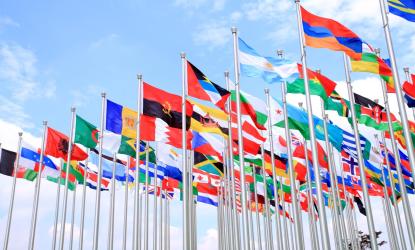- Global (EN)
- Africa (EN)
- Australia (EN)
- Belgium (EN)
- Brasil (PT)
- Canada (EN)
- Canada (FR)
- China (CN)
- France (FR)
- Germany (DE)
- Germany (EN)
- Hong Kong, China (EN)
- India (EN)
- Indonesia (EN)
- Ireland (EN)
- Italy (IT)
- Italy (EN)
- Japan (JP)
- Korea (KR)
- Latin America (ES)
- Malaysia (EN)
- Middle East (EN)
- Netherlands (EN)
- Spain (ES)
- UK (EN)
- Global (EN)
- Africa (EN)
- Australia (EN)
- Belgium (EN)
- Brasil (PT)
- Canada (EN)
- Canada (FR)
- China (CN)
- France (FR)
- Germany (DE)
- Germany (EN)
- Hong Kong, China (EN)
- India (EN)
- Indonesia (EN)
- Ireland (EN)
- Italy (IT)
- Italy (EN)
- Japan (JP)
- Korea (KR)
- Latin America (ES)
- Malaysia (EN)
- Middle East (EN)
- Netherlands (EN)
- Spain (ES)
- UK (EN)
Gen-Z have complex feelings about the future.
The Edelman Trust Barometer Special Report: Trust at Work data shows that the youngest Gen-Z are incredibly pessimistic in their outlook, while the oldest Gen-Z are incredibly optimistic. This intra-generational optimism gap is far greater than that between employees of different income levels, sexes, and political leanings, highlighting a fascinating data-driven contrast to the stereotype of Gen-Z as a doom-and-gloom generation.
While Gen-Z are in fact more optimistic than other age groups – 67% agree that they and their family will be better off in five years – only 39% of corporate associates (entry-level employees and experienced non-managers, many of whom are Gen-Z) are as optimistic. This demonstrates a key finding:
The most misunderstood optimism gap is within Gen-Z itself.
On the one hand, this does not come as much of surprise considering the factors. Many younger Gen-Zers are university students and recent graduates whose studies were reshaped by the challenges brought out by COVID-19. Many are experiencing their first “normal” work environment at a time when employees of all generations are withdrawing from the in-person work cultures that may have traditionally generated that optimism.
On the other hand, pessimism is not inherent to Gen-Z, and it would be both unfair and inaccurate to ascribe pessimism to the whole generation. The oldest members of Gen-Z are better equipped to navigate the evolving hybrid workplace and have become more optimistic as they grow into mid-level manager roles in their mid-to-late-twenties. Over time, it could be fair to expect that all Gen-Z can become similarly likely to trust their employer and take on additional work – the youngest members of Gen-Z just need time.
At the heart of Gen-Z’s intra-generational optimism gap is the employer-employee relationship.
The Edelman Trust Barometer Special Report: Trust at Work shows that amidst a lack of trust in public institutions, employers have filled the void, becoming not only the most trusted institution of all, but also the most reliable indicator of economic optimism generally. It follows that employers owe these youngest Gen-Z employees the benefit of the doubt. Employers must aim to better understand the nuances of this generation, harness the potential of all Gen-Z employees, and invest in Gen-Z’s skill development, empowering them to take ownership of their roles and engage more deeply with their work.
Addressing the optimism gap among the youngest Gen-Z employees will not be easy, nor will it happen overnight. But it could create a ripple effect across the labour force and broader society. As highlighted by the Trust Barometer, economic optimism correlates strongly with trust in institutions, motivation, and employee engagement, which collectively improves society’s overall outlook.
Gen-Z are the young professionals of today and the leaders of tomorrow.
Gen-Z's level of economic optimism provides a valuable indicator of the health of our workforce and society. While the economic pessimism often associated with Gen-Z is not unfounded, neither is it pervasive at both ends of the age spectrum.
With time and proper investment, many members of this complex generation could develop the respect, patience, and agency they are encouraged to cultivate.
About Gen Z Lab
Gen Z Lab is Edelman's global offering comprising Gen Z employees, a roster of internal and external on-call advisors, and data hub dedicated to generational insights.
To learn more about the Gen Z Lab, please reach out to Catherine Santos.
In the UAE, employees’ optimism about personal economic futures is not only shaping how they view their careers but also driving their willingness to contribute to societal progress. The 2024 Edelman Trust Barometer: Trust at Work found that a remarkable 80% of employees in the UAE are confident that they and their families will be better off in five years, compared to 52% globally. This high level of economic optimism is fostering a culture of trust and, civic responsibility, as well as a desire to make a meaningful impact both in the workplace and beyond.
Impact as a workplace dealbreaker
An overwhelming 86% of UAE employees, on average, say that the ability to make an impact through their work is either a strong expectation or even a dealbreaker when considering a job. This trend is consistent across different demographics, with men, women, and individuals from various age groups and income levels valuing the opportunity to do meaningful work and contribute to addressing social problems.
This desire for impact reflects the changing priorities of the modern workforce. Employees in the UAE are not just looking for financial security or career growth; they are seeking roles that align them with broader societal goals. Employers that embrace this expectation by offering corporate social responsibility (CSR) initiatives and opportunities for meaningful work will be better positioned to attract and retain top talent.
Civic responsibility surges with optimism
The link between economic optimism and civic responsibility is especially strong in the UAE. Employees who are optimistic about their economic future are 14 points more likely to be willing to make personal sacrifices for the greater good of their country (Data collected as part of the 2023 Edelman Trust Barometer). In fact, 81% of optimistic employees in the UAE say they are ready to make such sacrifices, highlighting a growing sense of collective responsibility and engagement with societal issues.
This shift towards civic consciousness provides a significant opportunity for organizations to foster greater trust and engagement within their workforce. By supporting employees’ desires to contribute to societal progress, companies can build stronger connections with their teams and benefit from increased loyalty and advocacy. When employees believe their work contributes to something larger than themselves, they are more likely to invest in both their workplace and their communities.
Fostering impact to close the economic optimism gap
While economic optimism is already high in the UAE, organizations have the opportunity to close any remaining gaps by empowering employees to make an impact. Feeling like your employer respects diverse views and strives to make society better are one of the drivers of personal economic optimism for associates, globally. This, in turn, boosts morale, productivity, and trust within the organization.
By creating opportunities for employees to engage in projects that contribute to societal progress, whether through community engagement, CSR programs, or impactful business initiatives, businesses in the UAE can build a workforce that is not only highly engaged but also deeply connected to the company’s mission and the community.
The combination of economic optimism, trust, and civic responsibility offers a powerful formula for success in the UAE workplace. Employees who feel optimistic about their future are more likely to go above and beyond in their roles, advocate for their companies, and contribute to societal progress.
For organizations, the key lies in creating an environment where workers can make a meaningful impact, both within the company and in the broader community. By nurturing economic optimism and aligning business goals with societal values, employers can unlock higher levels of loyalty, trust, and productivity, driving both business success and positive change in the UAE.
The seismic shift in the U.S. electorate led to the massive victory for President-elect Trump. Voters focused on economic uncertainty and inflation. Working class people of all ethnic backgrounds shifted allegiance based on personal well-being. But the most stunning change was in younger voters, with young men, 18-29 years old, shifting 28 points to the right (3 million votes) while young women shifted 15 points (1.5 million votes). Creators played an important role in influencing younger voters.
President-elect Trump went with long-form Podcasts and unscripted content partnerships on YouTube to target young males. Among the shows he did were The Joe Rogan Experience podcast, Theo Von’s This Past Weekend podcast, and Andrew Schultz’s Flagrant podcast. Then there were sit downs with content creators such as professional golfer Bryson DeChambeau, Logan Paul, Adin Ross, and the Nelk Boys. The “Bro Podcast Tour” registered 123 million views for the fourteen appearances, reaching an audience that was 80 percent male. Half of these appearances were in October. The newly elected president sometimes appeared with his VP candidate, JD Vance, or Elon Musk.
VP Kamala Harris focused more on short-form video on TikTok and Instagram, more as media messaging channels than collaboration. The campaign tried to court Gen-Z voters by capitalizing on memes such as Brat Summer or Coconut Tree. The candidate appeared on five major podcasts in October (such as Alex Cooper’s Call Her Daddy), with 50/50 gender breakdown. She also did more mainstream media than the Trump campaign, with appearances on The View and 60 Minutes. Harris had VP candidate Tim Walz, Congresswoman Alexandria Ocasio-Cortez, and businessman Mark Cuban on her podcasts. Harris had a @KamalaHQ TikTok page. She relied heavily on celebrity endorsements from Beyoncé, Lady Gaga, and Taylor Swift.
Media consumption patterns are a key indicator in voter intention. Latinos and young people are twice as likely to get their news from social media (there is major crossover between youth and Latino given young population). The increasing reliance of young people on social channels as primary outlets for news is seen in these two statistics. As of 2024, 52 percent of TikTok users get their news on the channel, up from 22 percent in 2020, while 40 percent of Instagram users get their news on the channel versus 28 percent in 2020. Part of this is lack of access to local newspapers (one third have closed in the past two decades) while the number of reporters is down 60 percent.
A few conclusions from Tyler Vaught, who runs our Creator Marketing offering at Edelman. First, the social media landscape has moved from User Generated Content to established episodic shows with massive audiences. Second, scripted, filtered, and edited content is out, while raw unedited authenticity and vulnerability is in. Third, lengthy, unscripted conversations with show hosts allow for the creation of parasocial relationships which build trust and affinity. Fourth, traditional celebrity endorsements have much less power over young voters because this generation prefers accessibility, getting to know the person.
Creators are no longer the future to build trust with audiences, they are the present. Trust in mainstream media has been deeply eroded, especially for Republicans and bottom quartile income earners. Brands must pay attention; politics is a mainstream topic for Creators, so risk mitigation is more important than ever. Brands should clearly establish their values, recognize their permission space, and thoroughly vet Creators for communities and conversations that make sense.
The Fight for Power (Updated)
Find out more
The American people have chosen. A red wave swept the country, with electoral results comparable to the Reagan victory 40 years ago.
The essential question for business at this time of change is ‘Quo Vadis?’ (Where to go?)
Four years ago, the world was staggering through the horrors of COVID-19, with enforced isolation and high death rates causing severe alienation in the work force. During the pandemic, George Floyd was killed by a police officer in Minneapolis, prompting protests and civil unrest and employee pressure to remedy decades of injustice. Rising temperatures and unusual climate events accelerated environmental policies. Sino-American trade tensions forced companies to adapt supply chains, while the Russian invasion of Ukraine caused many corporations to pull out of Russia.
CEOs spoke out publicly on these issues to employees, consumers, and other stakeholders hungry for leadership. Business was filling a competence void left by Government. Trust moved local, to My Employer’s CEO, with ‘information from your employer’ becoming the most important source of objective information.
Fast-forward to 2023 and, as political momentum gathered, CEOs shifted gears, increasingly keeping their heads down, believing staying out of the fray to be a less risky proposition. Some companies backed away from DEI commitments, affected by pressure from politicians and activists including Robbie Starbuck. The vast majority held firm.
Now the Trump team is promising a fundamental shift in direction for Government. Much of the Trump platform will be welcomed by business, specifically deregulation, lower taxes, and a pro-growth agenda. But there will be areas of contention between business and the new administration, such as trade and tariffs. Without question, handling employee pressure is going to take up far more bandwidth for executive teams.
The election was all about the economy. This is the time when business can shine, with well-paid jobs and affordable products that provide a better quality of life. There is a place in the middle for business to operate with values and commercial clarity. Action on global matters can’t happen without business leadership but must be done without political ideology as an overlay.
This is the leadership opportunity of the moment; to show progress on problems that affect your business or industry directly, including advocating for policies that enhance company performance while building a strong culture. The decision to be made, therefore, is not whether to speak publicly on issues, but when. That’s just good business — and it’s what your employees and customers will certainly demand.
Richard Edelman is CEO.
Public & Government Affairs - Team
Edelman's Public & Government Affairs shape favorable policy and regulatory outcomes to help meet your business objectives.
Find out more
Building Trust in Election Coverage by Prioritizing the Citizens' Agenda
Gen Z Politician on What's Motivating the Youngest Voters
2024 Edelman Trust Barometer: Supplemental Report - Energy Sector
In South Africa, trust in the energy sector is on the rise, with growing confidence in green energy solutions.
Find out more





